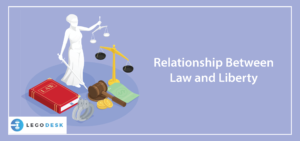Relationship Between Law and Liberty

What is Law?
The Black’s Law Dictionary defines law as the aggregate of legislation, judicial precedents, and accepted legal principles; the body of authoritative grounds of judicial and administrative action; esp., the body of rules, standards, and principles that the courts of a particular jurisdiction apply in deciding controversies brought before them.
Read Also – How to start a law practice with no money in 2021?
What is Liberty?
Liberty is the freedom from arbitrary or undue external restraint. It is a right, privilege, or immunity enjoyed by prescription or by a grant. Liberty is of two types as according to Isaiah Berlin:
- Positive Liberty – Positive liberty has the capacity to act on one’s own will. It is freedom from internal restraints. Jean-Jacques Rousseau advocates this theory in his concept of ‘general will‘ where he illustrated how individual liberty was the power of an individual to act in the government and bring changes. This includes the concept of self-governance and democracy.
- Negative Liberty – Negative liberty is the concept of attaining freedom from external restraints. An individual is free from any interference by other persons as according to negative liberty. Thomas Hobbes and John Locke are the proponents of this theory.
Read Also: Know About Defamation in Indian Law
Relationship between Law and Liberty
There are two kinds of relationships between law and liberty:
1) Positive Relationship
This approach provides for a positive relationship between law and liberty. Law promotes liberty. The more law there is the, more liberty there is. And as soon as law ends, liberty also ceases to exist. Where there are no laws to protect or provide freedom and liberty, violations of the same take place. John Locke suggests that where there is no law, there is no freedom. Professor Willoughby has asserted that “Freedom exists only when there is restraint.” Gettell observes, “Liberty in any real and dependable sense is possible only if sovereignty exists and becomes more perfect as sovereignty is more completely organized.”
Read Also – Tips For Becoming a Successful and Efficient Lawyer
Law protects liberty is in several ways. Firstly, the law helps in establishing a civilized society, thereby easing the way of life for individuals. This is done by the creation of a provision for punishment to the criminals. Secondly, it guarantees rights and duties to the citizens and individuals. The state intervenes whenever the rights of an individual are violated by another. Thirdly, the constitution acts as the custodian of liberty. It is the constitution that provides the authority of the state and protects the fundamental rights of the people.
This approach has been upheld by the Supreme Court of India in its various decisions. For example, in Maneka Gandhi v. Union of India, when the personal liberty of the petitioner was abrogated, the Supreme Court protected her liberty in consonance with the Constitutional rules. Similarly, in the case of Navtej Singh Johar v. Union of India, the Supreme Court provided that Homosexuals were free to choose their partners and had liberty in doing so.
Read Also – Negative Effects Of Divorce On Children’s Mind And Health
2) Negative Relationship
Several theorists suggest that there exists a negative relationship between the two. However, there are two dimensions of the same:
- The more the law, the less the liberty – This approach advocates the concept of ‘state of nature,’ that is, anarchy. Anarchy is a state where there is no law or government to regulate the acts of an individual. The pure state of nature or “the natural condition of mankind” was deduced by the 17th century English philosopher Thomas Hobbes. According to Hobbes, the state of nature is a negative concept; i.e., it was a constant state of war. However, Rousseau and Locke provide a rather positive interpretation of the state of nature.’ According to them, life in the state of nature was happy, and there was equality among men. This approach suggests that law restricts liberty. It was highly prevalent in the 18th-19th Century. Some scholars even suggest that the concept of state endangers the concept of liberty.
Read Also – Understanding Live-in Relationship And Its Concept - The more the liberty, the less the law – Some scholars advocate that law should not provide for liberty because more provisions for liberty would defeat the ultimate purpose of the law. In other words, liberty is in contradiction with the purpose of law and therefore, negates it. Professor A.V. Dicey advocates this approach.
Read Also – Here is the Importance of Legal Research in Legal Practice
Conclusion
Thus, the relationship between law and liberty is ambiguous in nature. A positive approach is more prevalent in present times. The negative approach, either advocates for the absence of a legal scenario or the absence of liberty. Both the dimensions of the negative approach endanger a civilized society. Where law ends, anarchy begins, and where liberty exits, tyranny enters.
Read Also – Is Live-in Relationship legal in India?
Try our Debt Resolution solutions today Request a Demo